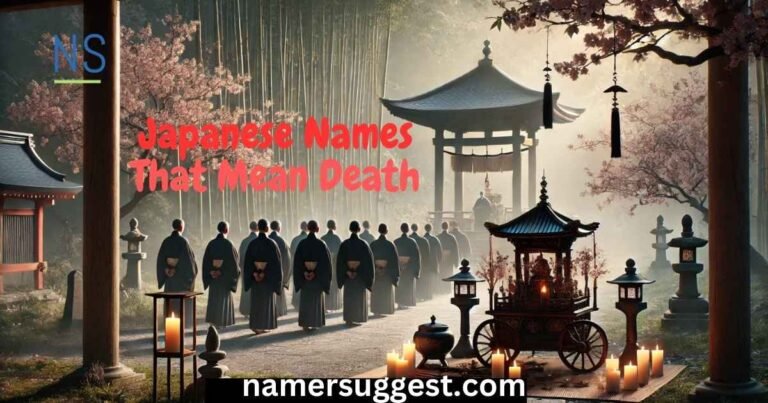
Japanese names are more than just ways to identify people. They hold deep meaning, culture, and spirituality. In Japan, names reflect beliefs about life, death, and the afterlife. They are a connection to philosophy and spiritual significance.In this article, we’ll explore a wide variety of Japanese names that mean death, their symbolic connections to Japanese mythology, and their representations of darkness, spirits, and the inevitable end of life.
This guide will provide a rich exploration. Mystical and spiritual concepts may be evoked by the names you are interested in. The symbolism behind death-related names in Japanese culture may also be understood.
Japanese Names That Mean Death Generator
Explore a collection of Japanese names with death-related meanings using our “Japanese Names That Mean Death” generator. Try it now to discover unique, symbolic names with deep cultural significance.

Top Picks: Japanese Names That Mean Death
Before diving into specific categories, let’s look at some top Japanese names related to death. These names are powerful, often tied to spirits, gods, or demons in Japanese folklore. They carry meanings associated with death, destruction, or spiritual transitions.
| Name | Meaning | Symbolism |
| Shiho | Death, Obscurity | Represents the unknown, mystery of life and death. |
| Kurayami | Darkness | Symbolizes the eternal dark, a state of oblivion. |
| Rei | Soul, Spirit | Represents the departed soul, the transition between life and death. |
| Kuro | Black | Associated with mourning, the color of death in Japanese culture. |
| Yami | Darkness | Refers to the profound and eternal darkness of the afterlife. |
| Oni | Demon | Refers to the demonic creatures in Japanese folklore, often associated with death or destruction. |
Japanese Girls Names That Mean Death
In Japanese culture, girls’ names that signify death often symbolize spiritual transitions, impermanence, or the fleeting nature of life. These names serve as reminders of the natural cycle of life and death, and their meanings are often deeply rooted in both Buddhist and Shinto beliefs.
- Rei (Spirit, Soul) – Represents the departed soul, symbolizing the transition between life and death.
- Shiho (Death, Obscurity) – A poetic name evoking the mystery surrounding death.
- Yami (Darkness) – Embraces the eternal dark, often linked with the end of life.
- Aika (Love and Death) – Symbolizes the bittersweet connection between love and death.
- Miku (Beautiful, Eternal) – While not directly meaning “death,” it represents eternity, a concept closely tied to death.
- Kage (Shadow) – Represents the shadow of death, a symbol of the unknown lurking behind life.
- Miyu (Beautiful, Soft) – Symbolizes the gentle passage from life to death.
- Hana (Flower, Death) – The fleeting nature of life, as flowers bloom and wither.
- Yukari (Fate, Connection) – Often associated with the inevitable connection between life and death.
- Miko (Shaman) – Represents a medium between the physical and spiritual worlds.
These Japanese girl names with death meanings convey a deep connection to the impermanence of life and the spiritual realms.
Japanese Boys Names That Mean Death
For boys, names that symbolize death are often tied to strength, resilience, and the honor of facing death. These names are frequently linked to warrior culture, where death is an inevitable part of life, and courage in the face of mortality is prized.
- Raiden (Thunder God) – A powerful god associated with destruction, often representing the destructive force of death.
- Kuro (Black) – A name invoking the color of mourning, symbolizing the shadow of death.
- Kage (Shadow) – Symbolizes death’s shadow, lurking near the end of life.
- Shinji (True, Death) – Represents the truth of mortality, emphasizing the inevitability of death.
- Tetsuya (Iron, Warrior) – Symbolizing strength and resilience in the face of death.
- Kaito (Ocean, Death) – The vast ocean represents the journey into death’s unknown.
- Taro (Great Son, Strong) – A strong name that can symbolize a courageous death.
- Jiro (Second Son) – This name can symbolize the passing of one to make way for the next.
- Isamu (Courageous, Deadly) – Represents bravery in facing death without fear.
- Hiroki (Wide, Strong) – Strength that endures even in death.
These death-related names for boys emphasize spiritual significance and warrior-like courage needed to face death.
Japanese Names That Mean “Dark Angel”
In Japanese culture, the dark angel is often a figure who governs over the transition from life to death or serves as a guide for the souls of the departed. These names are rooted in spirituality and symbolize the guidance of departed souls through the afterlife.
| Name | Meaning | Symbolism |
| Kuroi Tenshi | Black Angel | A dark protector, guiding souls into the afterlife. |
| Kage Tenshi | Shadow Angel | An angel who guides souls through the shadow of death. |
| Rei Tenshi | Spirit Angel | A guiding spirit that watches over the departed. |
| Yami Tenshi | Dark Angel | Represents an angel who governs the underworld. |
| Kuro Tenshi | Dark Angel | The angel of death, guiding souls through darkness. |
These dark angel names connect the spiritual and mystical realms, where the dead are guided by supernatural beings into the afterlife.
Japanese Names That Mean “Deadly”
Some Japanese names carry the meaning of deadly or destructive, representing both the power to end life or the bravery to face death. These names are often tied to the warrior tradition or the natural forces that are beyond human control.
- Isamu (Courageous, Deadly) – Represents strength in facing death bravely.
- Takeshi (Fierce, Deadly) – Symbolizes someone who is fierce in battle, ready to face death without hesitation.
- Satoru (Enlightenment, Death) – Represents an understanding of the transient nature of life and death.
- Akira (Bright, Deadly) – Signifies a sudden and intense death, shining brightly before the end.
- Hiraku (To Open, To Die) – Symbolizes the opening of the door to death’s embrace.
- Ryuji (Dragon, Life and Death) – The dragon symbolizes the cycle between life and death.
- Riku (Land, Deadly) – The land represents the final resting place for the dead.
- Daiki (Big, Noble, Death) – A name that signifies a noble and honorable death.
- Nobu (Faith, Trust, Death) – Reflects a trust in the natural cycle of life and death.
- Jun (Pure, Deadly) – A pure soul facing the inevitable end with grace.
These deadly names evoke the warrior spirit and strength to face the end with honor and courage.
Famous Japanese Names with Dark Meanings
Many names from Japanese folklore and mythology carry dark or death-related meanings, reflecting the cultural and spiritual understanding of death as part of life’s cycle. These names often invoke powerful spirits, gods, or mythical beings associated with the underworld.
| Name | Meaning | Symbolism |
| Oni | Demon | A terrifying force representing destruction, often linked to death. |
| Akuma | Devil, Demon | A malevolent spirit from the underworld, symbolizing death and destruction. |
| Ryou | Evil Spirit | Represents spirits that haunt the living and cause death. |
| Kurozai | Dark Demon | Symbolizes a menacing force, often linked to death and destruction. |
| Kijin | Demon God | A powerful, god-like demon representing destruction and death. |
These famous names with dark meanings are integral to understanding the cultural significance of death in Japan.
Frequently Asked Questions (FAQs)
What are Japanese names that mean death?
Japanese names that mean death often symbolize the transition to the afterlife, spirituality, and the inevitable end of life. Names like Shiho, Raiden, and Akuma are directly linked to death in both meaning and cultural significance.
Are there any Japanese girl names with death meanings?
Yes! Japanese girl names like Rei, Yami, and Miyu carry meanings related to death, symbolizing the transient nature of life, spirituality, and the inevitable passage to the afterlife.
Do Japanese death names have any spiritual significance?
Yes, many Japanese death-related names have spiritual significance, often drawing on influences from Shinto and Buddhism, which emphasize impermanence, the afterlife, and the cycle of life and death.
What is the significance of “dark angel” names in Japanese culture?
“Dark angel” names, like Kuro Tenshi or Yami Tenshi, symbolize guardians or guides for souls after death. They represent spiritual transitions and the guidance of souls into the afterlife.
How do Japanese names symbolize death and the afterlife?
Japanese names symbolize death and the afterlife through mythological figures, spiritual beliefs, and cultural symbolism. Many names are tied to gods, spirits, and mythical beings associated with death or the transition to the other side.
Conclusion
In Japanese culture, names associated with death carry profound meanings, connecting the living with the spiritual world. Whether through the symbolism of darkness, the power of spirits and gods, or the inevitable passage of time, these names offer insights into how death is viewed not as an end, but as a part of the natural cycle of existence. By understanding the significance of these names, we gain a deeper appreciation for Japanese spirituality and the rich cultural heritage surrounding life, death, and the afterlife.
From demon-inspired names like Oni to peaceful death names like Miyu, these names encapsulate the diverse perspectives on death in Japan. They remind us that while death may be inevitable, it is also a deeply spiritual and meaningful journey.






Leave a Reply